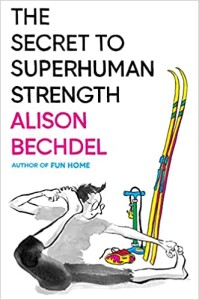 I’ve loved Alison Bechdel’s work from the first page of her award winning graphic memoir Fun Home. I know I’m not alone in my enthusiasm for her work, but I just want to get out there that I connect with her work on a lot of levels, even though I’m a straight white CisHet man. We’re of a generation, although I’m a mid-generation Boomer and she was born at the tail end of the Postwar Baby Boom. I like her literary style, her graphic style, and her sense of humor, and I also identify somewhat with her persona as an introvert, a reader, and as one who finds it hard to let go of anxieties without some chemical assistance.
I’ve loved Alison Bechdel’s work from the first page of her award winning graphic memoir Fun Home. I know I’m not alone in my enthusiasm for her work, but I just want to get out there that I connect with her work on a lot of levels, even though I’m a straight white CisHet man. We’re of a generation, although I’m a mid-generation Boomer and she was born at the tail end of the Postwar Baby Boom. I like her literary style, her graphic style, and her sense of humor, and I also identify somewhat with her persona as an introvert, a reader, and as one who finds it hard to let go of anxieties without some chemical assistance.
In her latest work The Secret to Superhuman Strength Bechdel continues to demonstrate the nearly superhuman feat of publicly exploring her life (in both text and art) through different lenses. After producing a lesbian-themed comic strip for many years, in Fun Home she dug through her childhood in Pennsylvania with her extremely cool and distant mother, an actor and teacher; her closeted gay father, a teacher and mortician; and her two younger brothers – and she comes out as gay finds her voice as a comic artist, and [spoiler alert] deals with her father’s suicide. In the follow-up Are You My Mother?, a much more literary and dense affair, she digs deep into her relationship with her mother through therapy, her art, regular and frustrating conversations with her mother, and with the assistance of literary giants like Virginia Woolf.
So first book daddy issues, second book mommy issues, what’s left but to turn the lens squarely on herself. (Reductive, I know…) Since she was born at the beginning of a decade, a natural organizing theme presents itself and her life is broken up by chapters that are also decades. This time out Bechdel explores her lifelong obsession with physical fitness, beginning with family skiing trips. In many ways her persona is a stand-in for Americans in general as we careened through all the fitness movements and fads – skiing, jogging, distance running, bicycling, meditation, yoga, and more – including the ever-growing commercial aspects of the pastimes from L.L. Bean gear to extreme mountain bikes, FitBits and Pelotons. She goes from a high schooler wearing Bean boots and flannel shirt, to Patagonia fleece and then all manner of high tech apparel and gear. And she cycles through spiritual practices but seems always to come back to some form of Buddhist thought.
Bechdel is doing so many things in this book and doing them so well you don’t always notice them because you’re so intent on the narrative. This time out instead of Woolf her literary focus is on the Romantics and Transcendentalists: the troika of Coleridge and the Wordsworths, William and his sister Dorothy; Ralph Waldo Emerson; and the Beat writer Jack Kerouac. All of these writers were drawn to the outdoors and especially mountains, so one of the book’s central motifs is mountain climbing – both literally and metaphorically, of course. She juxtaposes her need for time in the outdoors with her workaholism that requires long stretches hunched over a drawing board or computer; and contrasts the way her constant inward focus leads her into downward emotional spirals only broken by outdoor time. And the constant thread is her obsession with fitness fads that promise “super-human strength” and her growing awareness of mortality. And of course doing a full life autobiographical comic means revisiting the periods during which she created those first two books, re-examining herself as she examined her relationships with Dad and Mom (not to mention a succession of other women).
But this is a graphic memoir, a “comic,” right, so shouldn’t it be “funny”? Rest assured. I had a lot of laugh-out-loud moments while reading The Secret to Superhuman Strength, mostly from her astute and witty takes on the foibles and fads that seem to mirror the decades. She’s not above visual jokes, slapstick, or puns, and she doesn’t really punch up or down, just mostly at the mirror, shadow-boxing her way through life as she tries desperately to outrun the anxieties that also provide her with fodder for her livelihood. It’s a lifestyle guaranteed to create lots of conflict both inner and outer, and Bechdel looks back on it all with an eye that’s at times jaundiced but more often compassionate. I wish her peace, but not so much peace that she stops creating these angsty, thoughtful and wryly funny graphic masterpieces.
(Houghton Mifflin Harcourt, 2021)
